Link exchange sparks heated debates. Critics abound, but so do success stories. From my years in SEO, I stand with those who've seen results.
In this article, I’ll show you why link exchange deserves your attention and how it can boost your SEO strategy effectively.
What is Link Swap?
Link exchange, also known as link swap, is an SEO practice where two or more websites agree to link to each other.
For example, site A links to site B, and in return, site B links back to site A. This strategy aims to increase visibility and improve search engine rankings for the participating websites.
According to Authority Hacker, 51.6% of link-building specialists use link exchanges as a primary tactic. Also. according to our recent survey, 24.8% of experts say that link exhanges remain one of the most effective tactics.
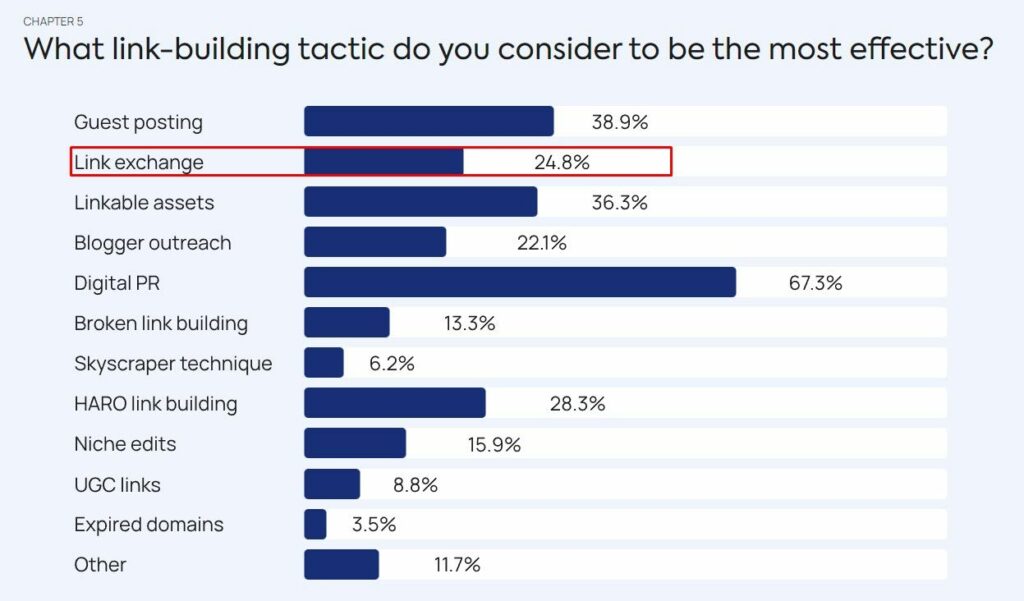
Despite its popularity, LE remains a hot topic of debate within the SEO community.
Why the controversy?
Many SEO specialists, especially those not deeply involved in link building, often advise against backlink exchange. This caution stems from Google's guidelines, which discourage excessive reciprocal linking to prevent manipulation of search rankings.
However, I've seen the evolution of link exchanges practices firsthand since 2007.
What started as simple reciprocal links has now evolved into more sophisticated methods like 3-Way Link Exchanges. Big companies like Monday, HubSpot, G2, and Venngage use this method to get great SEO results.
Today, backlink exchange isn't just about swapping links. It's about creating valuable, relevant content that helps both websites and their readers.
Strategies like digital PR, guest posting, and making linkable assets improve the quality of link exchanges.
In fact, according to our recent survey, 67.3% of SEO experts say digital PR is the best link-building tactic, and guest posting and linkable assets are also very popular.
Are Backlink Exchanges Bad for SEO?
Most traditional SEO consultants, who don’t specialize in link building, often advise against any form of link swapping. They see it as a controversial tactic, with the community divided on whether it's a legitimate strategy or just a spammy shortcut.
So, what do the experts say?
Many suggest focusing on more sustainable link-building methods. Why? Because such swaps come with some significant risks. Google frowns upon "excessive" link swapping aimed at gaming the system, and that can land you in hot water with penalties.
But hey, things are changing, and the SEO world is always evolving. More and more seasoned pros are finding value in backlink exchanges when they’re done right. Imagine getting high-quality, authoritative backlinks without the headache!
How can you make sure your link exchanges are up to par?
- Use reliable metrics like Ahrefs’ (a well-trusted SEO tool) Domain Rating (DR), trusted by 69% of SEO experts.
- Don’t forget about AI tools — 44.2% of SEO professionals swear by them to find the best link exchange partners quickly and efficiently.
Remember, it's all about balance and quality. Swap links with relevant, high-value content that your audience will love. This way, you're not just playing by Google's rules; you're also giving your SEO a real boost.
What Are the Types of Link Swap?
When you hear about backlink exchange, you might think it’s just about trading links directly. But there’s more to it!
Let’s consider a few different tactics and choose the best one.
Reciprocal link exchange
This is the straightforward trade between two sites. Site A links to Site B, and Site B links back to Site A. However, this practice is outdated and risky. Google often sees it as an attempt to manipulate search rankings, which can lead to penalties.
3-way link exchange (ABC)
This tactic involves three different websites to create a less obvious link pattern. For example, Site A links to Site B, Site B links to Site C, and Site C links back to Site A. This method helps avoid the direct reciprocity that Google might flag.
Guest posting 3-way link swap
Here’s where things get creative. You (Site A) write a guest post for Site B, including a link to Site C. Then, Site C links back to Site A through a separate arrangement. This tactic not only masks the LE but also adds value through content contribution.
Additional tips
- Evaluating potential link exchanges partners is crucial. Focus on sites with a Domain Rating (DR) above 40 and at least 5,000 monthly organic visits. This ensures that the exchanged links are not only high-quality but also relevant to your niche.
- Consider the cost of acquiring quality links — 53.9% of SEO professionals spend over $300 per quality link, highlighting the importance of prioritizing quality over quantity in link exchanges.
As you can see, they can be more complex than they appear at first glance. But with the right approach, link exchange can be a powerful tool in your SEO strategy.
Can Link Swap Be Beneficial?
Ever wondered if such swaps can really help your SEO?
The answer is yes, but only if you're linking with high-authority, relevant sites that maintain top-notch content. Links from these credible sources are likely to gain value over time, boosting your site's authority and ranking.
Quality is key.
Focusing on reputable sites ensures that your link exchanges are beneficial. Engaging in link exchanges with real business websites can significantly support your SEO efforts, especially when done properly and in moderation.
Here's one success story to tell:
🚨 Jakub Rudnik, Director of Content Marketing at ActiveCampaign, shares his experience. During his time at Scribe, they traded nearly 1,000 links. The result? Blog traffic skyrocketed from 0 to 50k, eventually reaching 75k.
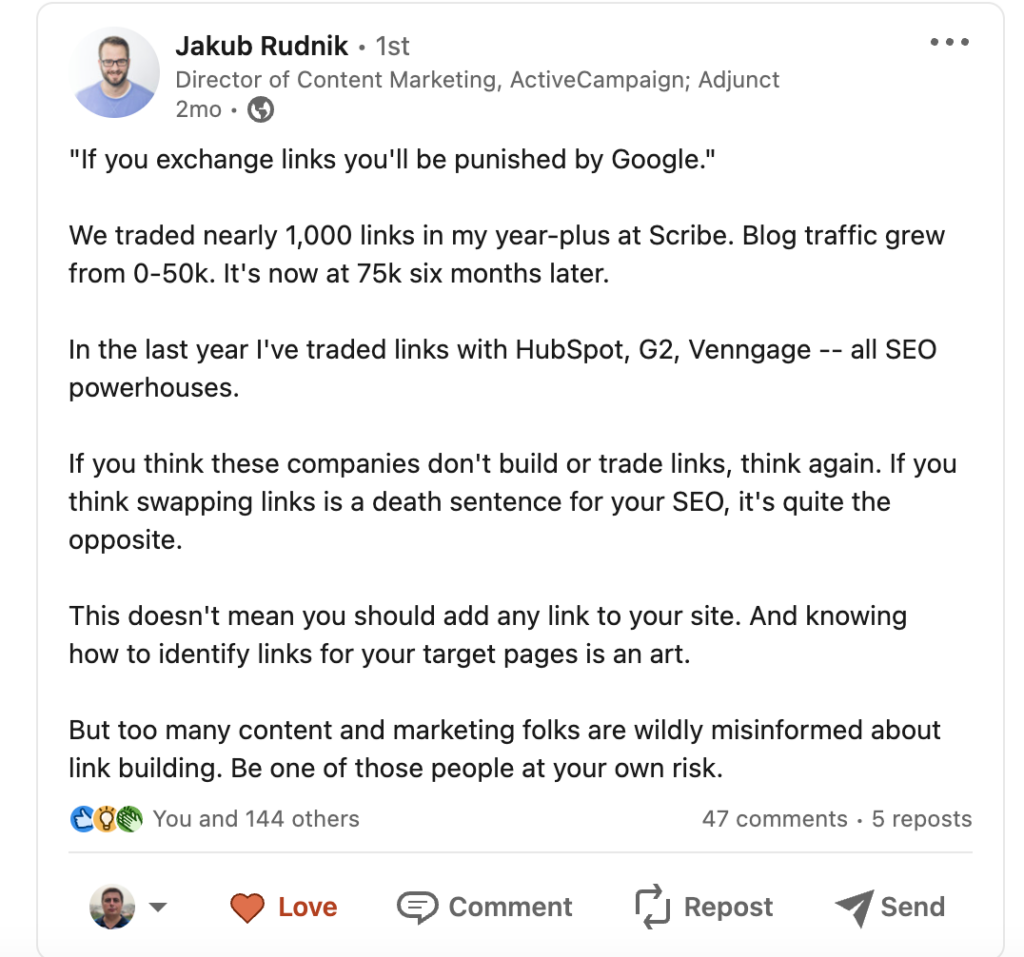
This example highlights how strategic backlink exchanges with the right partners can drive substantial traffic growth.
To maximize benefits, consider these strategies:
- Use metrics like Ahrefs’ Domain Rating (DR) to evaluate potential partners.
- Ensure your partners have at least 5,000 monthly organic visits.
- Engage with sites that are contextually relevant to your niche.
- Use AI tools to identify high-quality, relevant sites efficiently.
- Focus on creating high-quality, valuable content that naturally attracts links.
- Diversify your link-building strategy to include guest posting and digital PR.
- Regularly monitor and report on the performance of your exchanged links to ensure ongoing value.
Does Google Penalize Link Swapping?
Worried that link exchanges might get you in trouble with Google? You’re not alone.
According to Google Search Essentials, excessive backlink exchanges are indeed a no-no. Google’s algorithms are smart and designed to detect link schemes, including those "Link to me and I'll link to you" deals or pages created just for cross-linking.
These outdated tactics, like having a dedicated page filled with reciprocal links or using image links instead of contextual ones, are red flags 🚩. Google views these as attempts to manipulate rankings, and they can lead to penalties.
For instance, imagine a page on a website dedicated to mutual link swaps. It might include dozens or even hundreds of backlinks, none of which are based on content relevance or value.
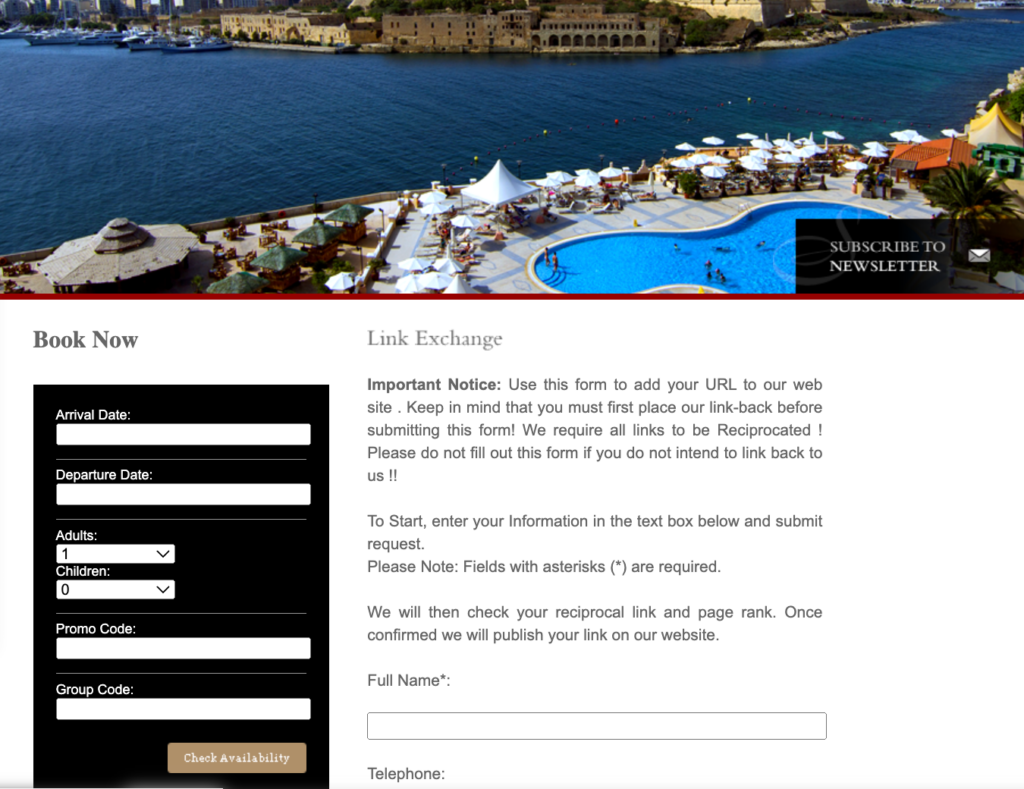
This is precisely what Google aims to discourage.
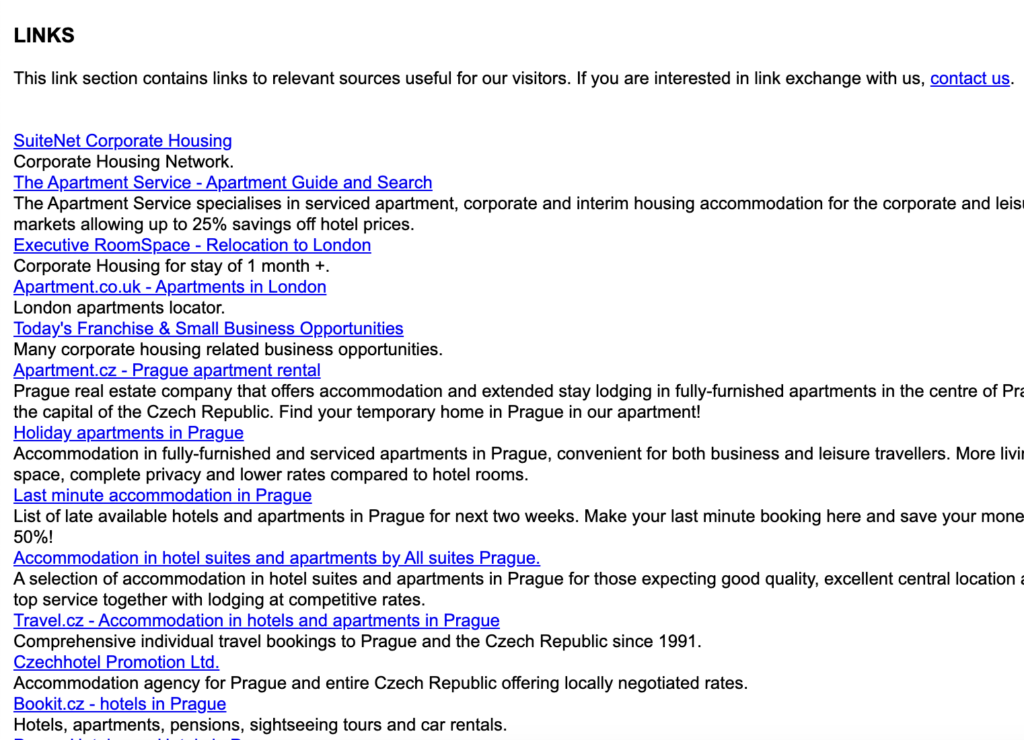
After you link to their website, they’ll link back to you from a page crowded with dozens or even hundreds of other links.
To stay on the safe side, focus on genuine, editorially-given links that provide real value to users. Moderation is key. Link exchanges should be just one part of a broader, diversified link-building strategy that includes high-quality content and natural link acquisition.
Should You Avoid Reciprocal Backlink Exchanges?
According to Ahrefs, 73.6% of websites have reciprocal links.
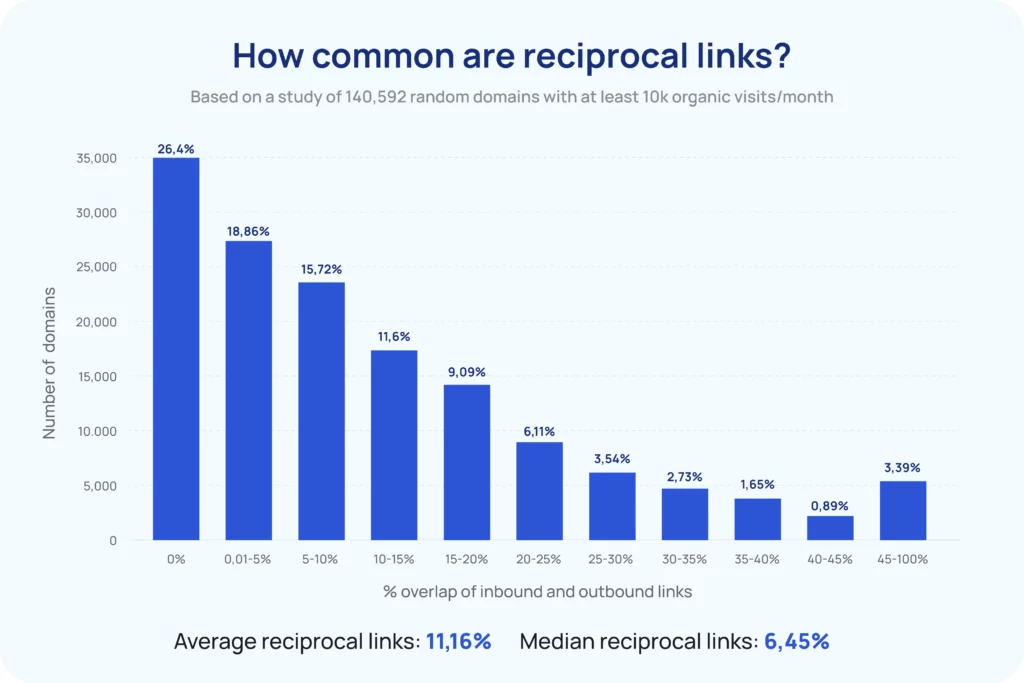
This shows that mutual linking is pretty common across the web, often happening naturally as websites with similar content or within the same industry reference each other.
The more popular your website becomes, the more likely it is to have mutual (reciprocal) links with other sites. However, reciprocal link swaps are a hot topic of concern often discussed on SEO forums.
Here’s an example from Reddit:
A user is faced with a high Domain Authority (DA) site requesting a link to their related article. This site is well-known, ranks well, has a high DA, and relevant backlinks in the same niche.
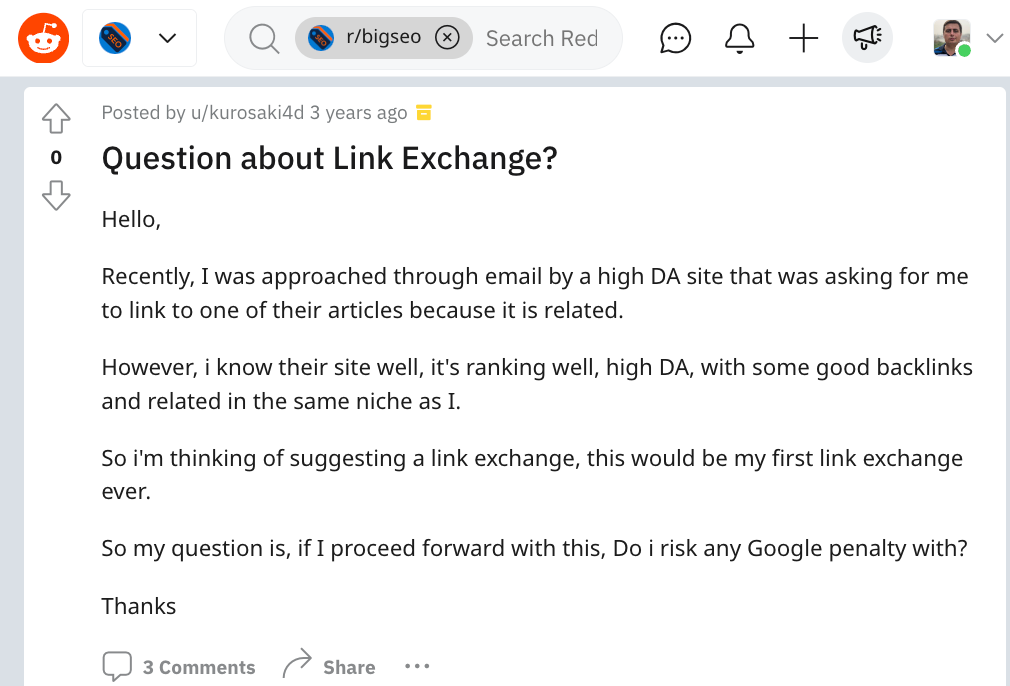
Considering a link exchange for the first time, the user is worried about the potential risk of a Google penalty if they proceed. They seek advice on whether moving forward with the link swap could lead to penalties from Google.
Can such an swapping lead to a penalty?
According to Google's guidelines, penalties mainly target excessive link exchanges, not genuine, editorially given links that add value for users.
In my experience and from what I've seen publicly, Google penalties specifically for link exchanges are rare. Linking to other websites is a natural part of the web's interconnected nature, facilitating the sharing of information and resources.
Modern practices like ABC link building are widely used by many companies, especially in the SaaS (Software as a Service) sector. This approach is more sophisticated and typically involves organic, content-driven linking rather than direct link swaps.
At Editorial.Link, we find two major advantages in using guest post swaps:
- Organic Link Building: Guest post swaps allow us to build links organically. In these posts, we include links to our own site as well as to other sites we have agreements with. This method helps us avoid direct link exchanges.
Instead of merely swapping links, we provide value through content, making the process more organic and favorable for SEO.
- Scaling Link Acquisition: Guest post swaps significantly increase the number of backlinks. For example, if you write 10 guest posts in a month, inserting 1 link to your site and another 4 to your partners, you’re not just getting 10 links to your site. You’re also receiving an additional 40 links from your partners' guest posts.
So, 10 guest posts can yield a total of 50 links.
To further maximize the benefits, focus on the following:
- Contextual Relevance: Ensure that the links are relevant to the content;
- Quality Content: High-quality, valuable content is crucial for effective link building;
- Diversified Strategy: Use a mix of link-building tactics, such as digital PR, guest posting, and creating linkable assets;
- Metrics and Monitoring: Regularly monitor and report on your backlinks to ensure they are beneficial and maintain their value over time.
Where To Find Link Swap?
Finding opportunities for link swaps can be a real challenge. However, there are several effective platforms and strategies to help you connect with the right contacts:
- Facebook Groups: Join groups related to SEO and digital marketing. These communities are active, and members frequently discuss backlink exchange.
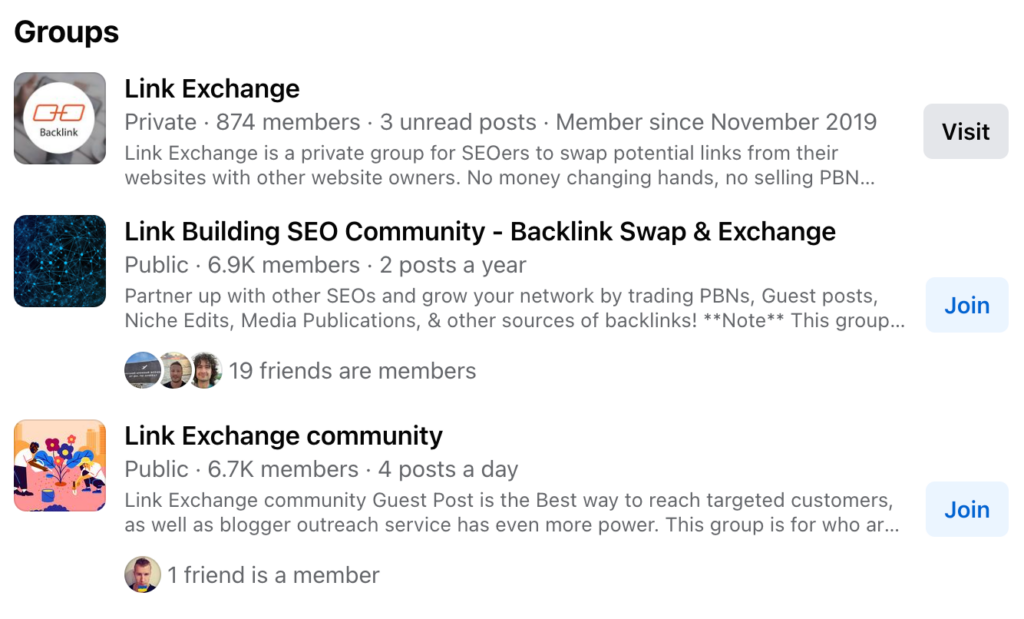
- Slack Channels: Slack channels focused on SEO and digital marketing are great places to connect with like-minded professionals. Engage in discussions and share your expertise to build trust and find new opportunities.
- LinkedIn: Network with other professionals in your industry on LinkedIn. Joining relevant groups or directly connecting with people can lead to fruitful link exchange discussions. Make sure your LinkedIn profile highlights your expertise to attract quality connections.
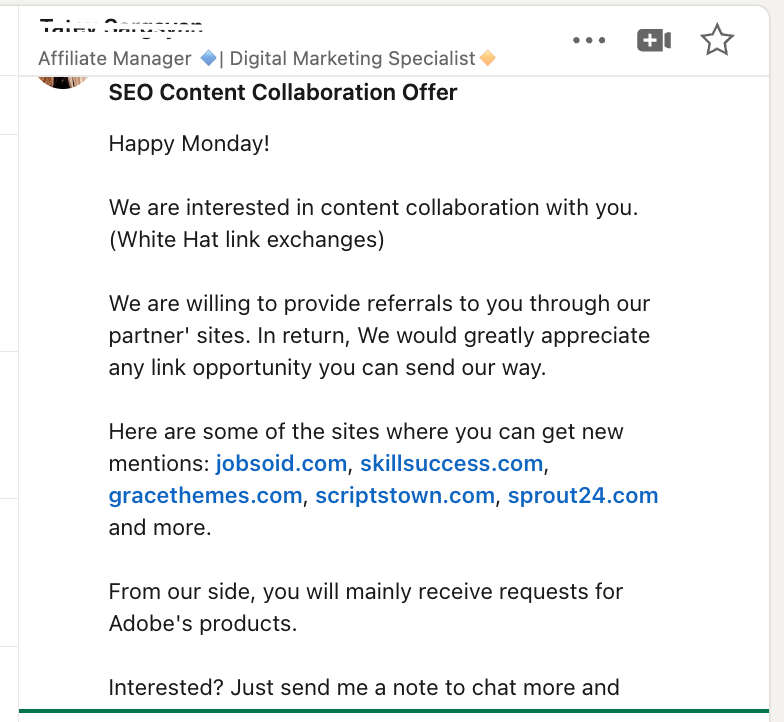
- SEO Forums and Communities: Participate in SEO forums and communities like Reddit, Moz, and Warrior Forum. These platforms are rich with discussions about link building and exchanges. Be active, contribute valuable insights, and look for exchange opportunities.
- Industry Conferences and Meetups: Attend industry conferences and local meetups. These events are excellent for networking and finding potential link exchange partners. Face-to-face interactions can often lead to more trustworthy and long-lasting relationships.
These platforms and strategies can help you find good partners for link exchange. Always aim to build mutually beneficial relationships and follow best practices for SEO to ensure the success of your link-building efforts.
Private Influencer Networks
Private Influencer Networks (PINs) bring together folks from similar but non-competitive industries to boost each other's website rankings on Google. It’s all about sharing guest posts and link opportunities among trusted peers.
But how do you get started? Here’s the lowdown:
- Finding and Joining PINs: First, find your potential PIN partners. Look for frequent guest post contributors on major blogs. Tools like Hunter can help you dig up their contact details. Then, reach out with a killer pitch. Highlight how working together can benefit both of you.
- Using Guest Posts to Your Advantage: Your first guest post is your ticket into a PIN. Write top-notch content for well-known, relevant websites with strong SEO metrics. Make your pitch stand out with unique ideas based on gap analysis for long-tail keywords.
- Building Solid Relationships: Once you’ve got your partners' links in your guest posts, they’ll likely return the favor. This mutual back-scratching leads to valuable backlinks for everyone involved.
- Become a Trusted Contributor: Before diving into PINs, I suggest building your reputation by contributing to 3-5 popular websites. This shows potential partners you’re the real deal. Once you’ve got a solid portfolio, either join existing PINs or start your own.
Tips for making It work:
- Create Quality Content: Your guest posts should be high-quality and valuable to readers. The better the content, the more likely you’ll get accepted by top sites.
- Personalize Your Outreach: Tailor your pitch for each partner. Show them exactly how the collaboration can be a win-win.
- Stay in Touch: Keep in regular contact with your PIN partners. Nurture these relationships and look for new ways to collaborate.
- Track Your Success: Use tools like Ahrefs or SEMrush to monitor how your guest posts and exchanged links are performing. Make sure your efforts are paying off.
PINs can be a powerhouse for your link-building strategy. It’s all about finding the right partners, creating great content, and building strong relationships
Backlink Swapping Challenges
Link swaps can be great for SEO, but they come with their own set of challenges. Without a solid team of outreach specialists and writers, you might find it a bit tricky to manage.
- Rejection Based on Low DA: Websites with high DA or DR might turn down your link exchange request if your site’s metrics don’t measure up. These numbers are a big deal for site owners when deciding whether to partner up.
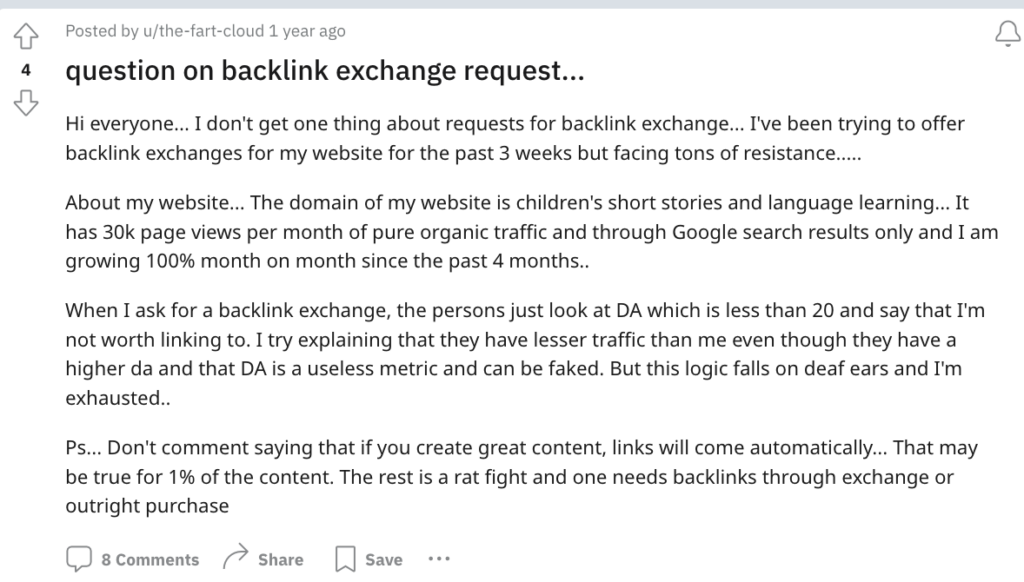
- Creating PINs Difficulty: Building a link swaps network isn’t easy. It takes a lot of social media activity, partner interactions, conference meetings, and tons of communication. The hardest part? Reaching out to top-tier websites and crafting guest posts that they’ll accept. Without access to these high-tier sites, your offer might not seem as valuable.
- Preference for Similar DA/DR Sites: High DA/DR sites typically want to link with sites that have similar metrics. This can make it tough for lower DA/DR sites to score beneficial link swaps with more authoritative sites.
- Extended Timeframe: Getting links can take a while. Some sites will only place your link after they see theirs live on your site. This back-and-forth can stretch out the timeline for effective link building.
- Need for Ongoing Contact Maintenance: You want to keep your contact database up-to-date. Some websites might remove your links after a while or switch them to nofollow. Regularly monitoring your partners and ensuring they’re trustworthy is essential to keep your link exchange strategy effective.
At Editorial.Link, we’ve cracked this code. We’ve built connections with over 2000 website owners and established strong PINs. We invest around $100,000 annually in top-tier tools like Ahrefs, SEMrush, and Hunter.
We have a dedicated team of 60+ experts — outreach specialists, researchers, writers, and guest posters— who help us secure links from top sites like HubSpot, Monday, ClickUp, and Envato. Their coordinated efforts enable us to offer competitive prices and consistently meet our link-building goals.
🔵 Our average DR for client links is 67, reflecting the high quality of our strategies. This boosts our clients' online presence and search engine rankings significantly.
A Simple Checklist for Link Exchange
Thinking about swapping links? Don’t rely solely on metrics like DA and DR. Here’s a quick checklist to help you decide if a site is worth your time:
- Legitimate Website: Make sure the site has regular updates, professional design, and relevant content for its industry. Avoid link farms and sites that are too easily accessible, like Medium or Fiverr. You want backlinks from exclusive, high-value websites.
- Growing Traffic: Check if the site shows signs of growing or consistent traffic. An active and well-regarded site is likely to bring more value through the backlink exchange.
- Healthy Outbound Links Ratio: Ensure the site maintains a healthy ratio of outbound links. Too many outbound links, especially if irrelevant, can signal a low-quality site to search engines.
Follow this simple checklist, and you’ll be able to determine if a link exchange is worth your effort and time.
Final Thoughts
To wrap it up, link swaps can be a powerful tool in your link building strategy. However, they require careful planning, a well-coordinated outreach effort, and ongoing management to be truly effective.
Don’t be intimidated by this tactic. Instead, focus on developing a smart approach to it. With the right strategy, you can avoid pitfalls and make link exchanges a valuable part of your SEO toolkit.

